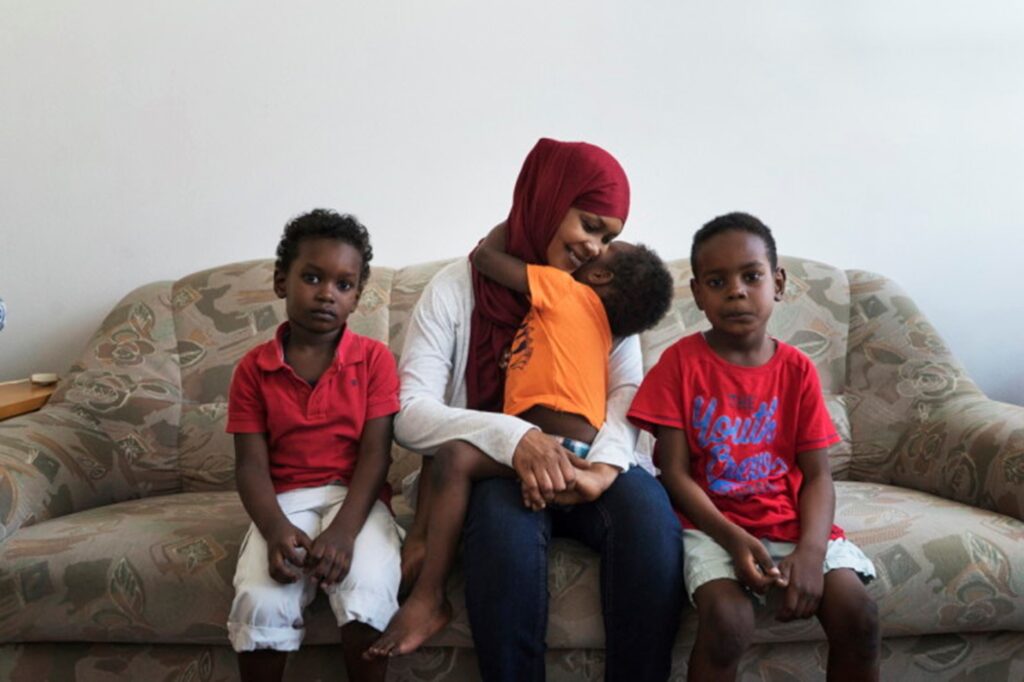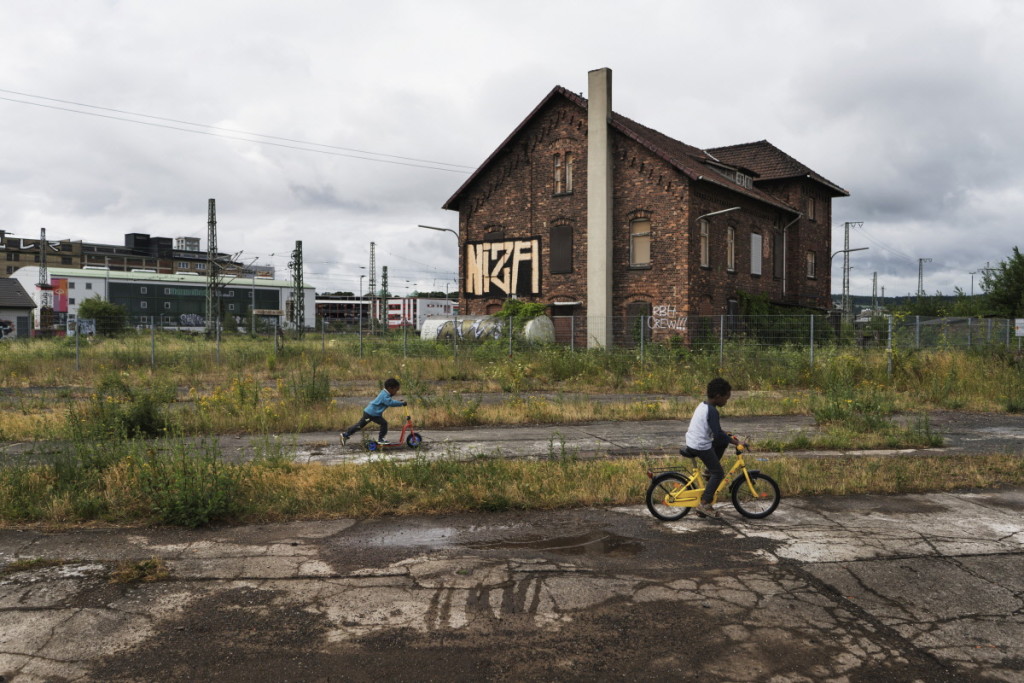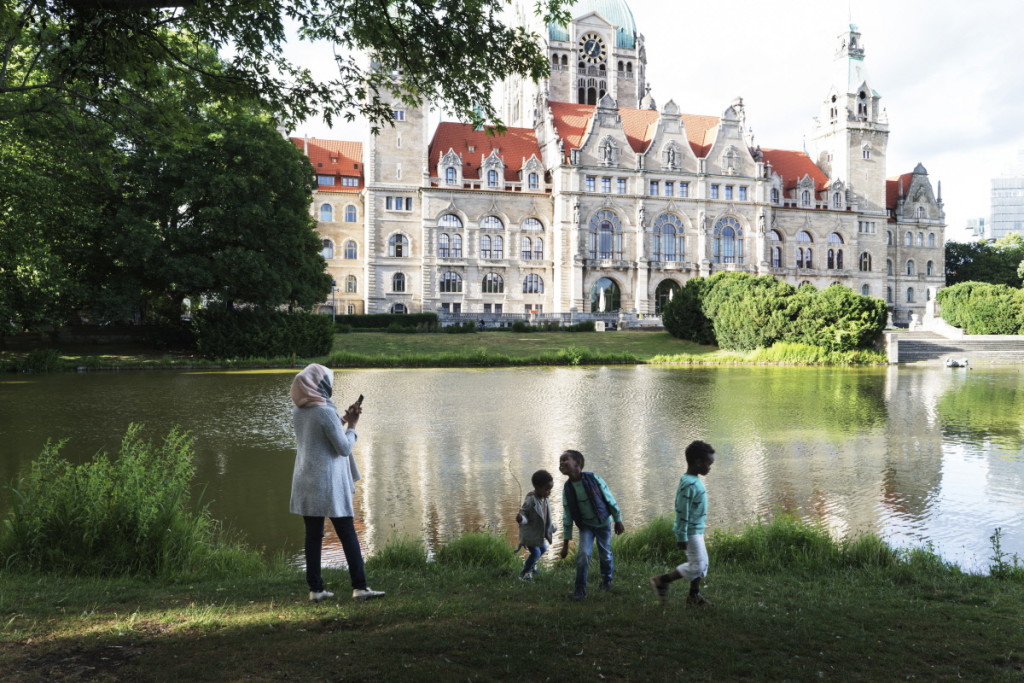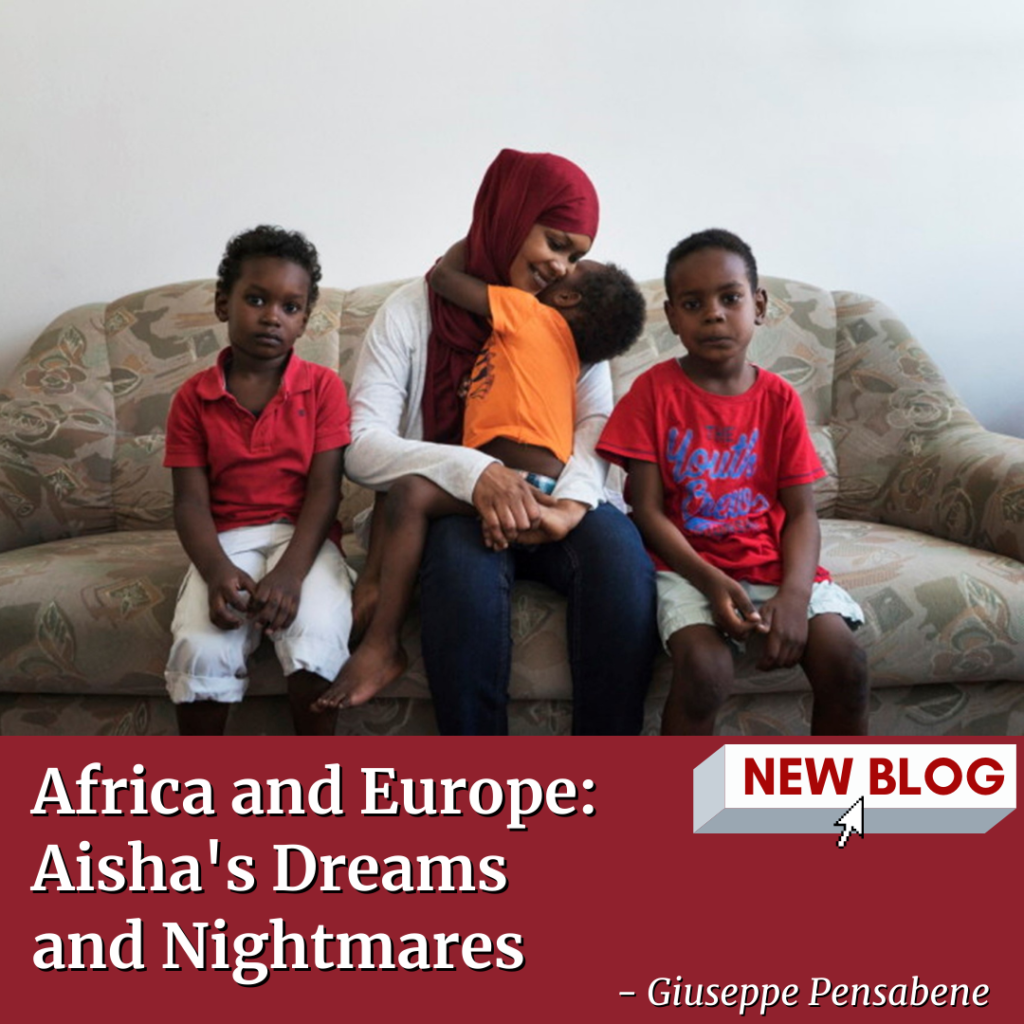Text by Giuseppe Pensabene, photographs by Alfredo D’Amato
Journalist Giuseppe Pensabene, aboard the Phoenix in 2017, meets Aisha for the first time and follows her story until her arrival in Germany. In his blog, he tells the story of this Sudanese refugee woman and describes the moment when he went to visit her in Germany to find out how her life in Europe is going. The following text is taken from the blog.

In July 2017, Aisha, with her three little children, boarded a rubber dinghy in the town of al-Khums, Libya. On 16 July, after 10 hours of navigation, the boat is intercepted and rescued by the Phoenix ship of the NGO MOAS. There are about a hundred people, mostly Sudanese. Single men are accommodated on the upper deck of the ship under an awning and women and children on the lower covered deck. Sabah and her three sons are immediately noticeable. She is beautiful, she has a black abaya and a grey hijab, the children are very small. […] After a few hours an indication arrives from the Coast Guard Coordination to transfer the rescued people to the Aquarius ship, which had already carried out other rescues and was en route to Italy, whilst we were to remain in the SAR (Search and Rescue) area, in case of new boats in danger. [Editor’s note: according to the NGO Code of Conduct, these transshipments of rescued people, between rescue boats, are required to take place – as was already the case – under the coordination of the Coast Guard. Transshipments were very common for operational reasons, not only between NGO ships, but also between them and Coast Guard Units, Navy or merchant ships].
[Editor’s note: according to the NGO Code of Conduct, these transshipments of rescued people, between rescue boats, are required to take place – as was already the case – under the coordination of the Coast Guard. Transshipments were very common for operational reasons, not only between NGO ships, but also between them and Coast Guard Units, Navy or merchant ships].Before saying goodbye to Aisha, I write my number on a tiny piece of paper, “if you have problems in Italy, call me”.
[Editor’s note: In June 2018, Aisha resumed contact with Giuseppe, until he decided to visit her in Germany, near Hanover, to find out more about her events from the arrival in Sicily to relocation to northern Europe.]

And so on Thursday 21st June 2018, we arrived in Hildesheim, a city of one hundred thousand inhabitants, located in Lower Saxony, half an hour’s drive from Hanover. Aisha lives in a complex for asylum-seeking families. Aisha’s apartment consists of a small room with just enough space for a sofa and another one with a double bed and kitchen furniture. She quickly explains that in theory she should no longer stay there, as having received full refugee status, with a passport, she has the right to move into a single apartment, paid for by the state. Finding vacant apartments, with owners who accept that the state pays the rent, and at the indicated amount, has become a big problem. Aisha tells us that she is in contact with a “simsàr“, a kind of intermediary between the tenants and her, who in exchange for a percentage of the rent has found her an apartment and will soon be moving. She says it is the only way to rent a house.

AISHA: I come from Darfur, from the village of Muhajiriyya, near Niyala and al-Fashir. Near the al-Kelma refugee camp, it’s famous, all Europeans know it. At least three organizations work there. We are from the al-Burgu tribe, one of the oppressed tribes and victims of racial discrimination by the government. […] When we sow, they come and burn the fields before the harvest, if they find a girl on the street they take her, or they come into the houses and take the women. Even if the father or the brother or the husband are at home, anyone, they take the women and they rape or kill them. And when they are young, 13, 14 years old – sorry but I speak directly – virgins, then they rape them in groups, groups of 5 or 6 men.
GIUSEPPE: What did you study?
AISHA: I studied at al-Nilayn University in Khartoum, one of the prestigious Sudanese universities, usually those who study law in al-Nilayn find work immediately. I studied literature and law. At the beginning when I started law I faced many difficulties, so much that I had to change tribe, deny that I came from the al-Burgu tribe, in order not to have problems with the professors. I went to study alone. I was pregnant with the eldest child, I wanted to study law to learn how to assert my rights and of other oppressed women like me. The girls of my village have the ambition to arrive in Khartoum, but when I arrived in Khartoum I realised that it was still too small for me, that my ambitions went further. […]
GIUSEPPE: Were you alone or was your husband with you?
AISHA: I separated from my husband and after six months I went to Khartoum. Ahmed was in my belly. Right after my last exam, I gave birth. The next year (at the university) they found out that I was from the al-Burgu tribe and I came from the village of al-Muhajiriyya and I had a bit of a difficulty, luckily there was a sympathetic professor who helped me, he explained to the others professors that I was not from the al-Burgu tribe, I said I belong to the Khabbaniya, a tribe well liked by the government, and I had no more problems, and I finished university. The daughter I had is dead. Before Ahmed I had had a girl. Within our tribe, before going to school, all the girls go through excisions, I was against my daughter doing it. But when I went to study in Khartoum, leaving the child in the village with her relatives, they immediately had her excised and she died of hemorrhage. They only informed me when I got back to the village. I suffered, I couldn’t accept it. I left my husband, my family and returned to Khartoum. It was difficult with little Ahmed, but I finished studying. When I finished I started studying Arabic literature and language again, I finished those too and went back to the village where I gave birth to two other children. But I’ve had a lot of problems with the government. I started volunteering against the practice of excision, because of what had happened to my daughter. I have also been arrested a few times for this. I taught in a public school, as soon as I finished teaching, I went to volunteer against excision. Because of this, they banned me from teaching in public schools. For me it was forbidden to teach in any public school, so much that I ended up teaching in a poor, private school. First I taught and had a monthly salary, then in any school I showed up, as soon as I gave my name, they told me that I could not work. In short, I started teaching in this private school, where I stayed for 5 years and a few months. Then I left. I had a number of problems that forced me to risk my life for my children. I said to myself: “enough, I’ll try to venture into an unknown destiny, to secure my children, rather than staying here, with everything that happens, I have to look for a safe place where my children are protected.” What I knew about Europe is that women’s rights and the rights of the child are protected, that there is no racism”.
[….]
AISHA: From Darfur we left for Chad, in Chad they treated us well, they certainly treat women better than in Libya, then we left for Libya. In Libya, many problems and suffering, they have taken and sold us twice. They called my children’s father, [to ask for ransom, as they always do], a Libyan called him and threatened that he would kill us if he didn’t send money. The father of my children told them to “kill them”. I explained my problem with the father of my children to the traffickers and they sold me to another group who put me to work at a lady’s house as a cleaning lady. I worked there for three months, then the woman helped me, she gave me some money and I went to Zuwara, where I made arrangements with the smugglers for the crossing. From there I moved to al-Khums, from where I embarked with a group of Sudanese.
GIUSEPPE: What happened after the rescue?
AISHA: We arrived in Pozzallo on 17/8/2017. After the center of Pozzallo (the Hotspot), they moved us to the Syracuse area. I asked to see a psychologist, they refused; I asked to make a phone call, they refused; I asked to see a lawyer to tell what happened to me, they refused. In short, I found a way to buy a bus ticket, and after lunch during siesta I fled with my children and took the bus to Catania. Then from Catania another bus to Messina, then the ferry, then Rome, from Rome to Turin, again by bus, then Ventimiglia. In Ventimiglia, I made an agreement with a Sudanese passeur. He took 500 euros to get to France, saying we would enter directly without having to walk. He put us in a taxi with 10 other people which left us near the border after less than half an hour on the road. We walked for 5 hours and arrived near Nice. There the police blocked us and brought us back to Italy.
GIUSEPPE: Did the French police send you back, even though you were a single woman with three children?
AISHA: Yes, they told me “good luck”. Once back in Ventimiglia, I looked for the Sudanese who had robbed us. We were in the area they call “the bridge”. There a legal operator came to look for me, she knew I was there with the children. They took me to the Red Cross center. After eight days they took us to Marseille by car. To cross the border they put us in the back with light suitcases on top, they apologized for this, but so we were not visible at the passage. I wanted to go to England, that was my plan.

When MOAS rescued us from the sea, I told myself that 80% of my plan had come true. I remember your voice telling us that you would take us to Italy. I remember the joy, I cried, I hadn’t cried yet, there I let myself go. I felt that 80% of my dream had come true, 20% was an unknown destiny that I had to build. 20% was the footprint, the asylum interview.
[Aisha takes a piece of paper and puts it in her mouth, explaining that when she’s nervous, she chews paper. I apologize for recalling these memories]
AISHA: You see, before, every time I talked about these things, I would start crying, but now I understand that it is good for me, I have to let off steam and talking about it helps.
The thing I hated the most about Europe is the fingerprint device, the denial (of the asylum request) and the repatriation (both to one’s own country and to the country of first arrival, i.e. Italy or Greece). When they gave me the positive answer and the passport, I was not happy, because I was thinking of all those who receive denial and repatriation, including many Sudanese brothers, but not only. Nobody leaves their country for pleasure.

How is it possible that someone who risks his life to get to salvation, to a safe place, arrives and finds something called the Dublin Regulation? Look, if the one who invented this regulation passed even half of what we went through, he would immediately abolish the Dublin Regulation and give nationality to all who arrive in this way.
[…]


After the interview, we decide to take a ride with the car, we go to Hanover where Aisha and her children have never visited, although it is only 30 minutes away. After the tour, we stop to eat in a kebab restaurant and I, while pretending to go to the bathroom, pay the bill, making Aisha furious, who tries in every way to put 50 euros in my hand. […]

When we leave, Aisha and the children cry, they accompany us to the car. We cry a little too. Once we arrive in Belgium, we open our suitcases. Inside a suitcase we find an envelope with 50 euros inside and a note from Aisha: “To my friend and brother Giuseppe, to my friend and brother Alfredo, I hope you can accept the invitation to yesterday’s dinner, with friendship, Aisha”.

